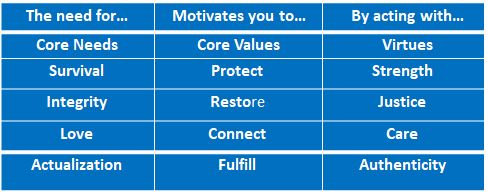Anger
How the Compassionate Warrior Effectively Responds to Anger
The values that transform anger.
Posted July 24, 2023 Reviewed by Michelle Quirk
Key points
- Compassion is an antidote to anger.
- The compassionate warrior values provide self-resiliency during uncomfortable emotions.
- To be a compassionate warrior is to strive for balance through self-regulation and ethical behavior.
The concept of the compassionate warrior is as old as the human race itself. It is both an archetype—that is, a symbol—as well as a practical way of living. Bushido (Japanese for “way of the warrior”) laid out the code of ethical behavior for the samurai. The attitude of the samurai is to focus on self-restraint and self-improvement and to continually strive to do the right thing while protecting themselves and those they loved.
The compassionate warrior spirit lives within every human being. It is part of our core (best) self; the source of our will to live, to be free, to give, to create, to defend ourselves and others, to know and do the right thing, and to fulfill our true potential. To be a compassionate warrior is to strive for balance through self-regulation and ethical behavior. It involves acting with courage, wisdom, patience, and responsibility. A compassionate warrior is committed to empathy and kindness, and the greater good. In essence, the compassionate warrior is the most courageous, wise, and powerful version of the self.
The compassionate warrior’s response to anger
What does it mean to be the compassionate warrior when you’re in a challenging, emotionally charged situation—particularly when you’re experiencing a powerful emotion such as anger? The key is to harness the wisdom of anger so you can act in a way that’s beneficial and healthy.
Wisdom allows you to use anger mindfully and deliberately to create peace and harmony rather than react in an aggressive way that will undoubtedly cause suffering. The compassionate warrior uses anger to invoke wisdom and then uses wisdom to constructively deal with the situation that has triggered the anger in the first place. By doing so, anger becomes a positive force that creates value for yourself and others.
The compassionate warrior acts with humility and is motivated by wisdom and love rather than by ignorance, aggression, or fear. When you learn how to bring your difficulties, challenges, and anger into the light of your wisdom, you can see the way toward equanimity and happiness. The enlightened version of anger is clarity and truth. While raw, impulsive anger is distorted and narrow, refined anger is sharp and accurate, deep and insightful.
The values of the compassionate warrior
Balancing your response to anger challenges you to use it for a higher purpose—toward creating value. You may ask, how are you to know what to do?
The first step in working with anger is to identify the four core needs that lie beneath anger: survival, integrity, love, and actualization, then, to figure out the way to act toward enhancing peace, harmony, and well-being. The below framework is designed to simply do that. You will see that each core need has a corresponding core value or way of creating good in your life. Furthermore, each value comes with its own set of supporting virtues. These tell you how to act to create a balanced response to anger and make it constructive.
The four transformative values
Together, the four core values form the compassionate warrior’s code of integrity. They are verbs, not nouns, because they are about action. They create value not just for you but for the wider world. To act according to the four transformative values is to take both personal and social responsibility.
- Protect: When your safety is threatened, anger motivates you to protect yourself and the people you love. When you are prevented from meeting your physiological needs, anger brings your attention to those needs and prompts you to take immediate and forceful action to take care of the survival and well-being of both you and those close to you.
- Restore: When something happens that violates your sense of integrity, anger motivates you to restore what you believe is just and right. When you are acting on the basis of deeply held functional values, righteous anger can inspire you to correct a wrong that has been inflicted or perceived. Moral anger gives human societies a way to enforce standards of justice and fairness. It offers a way to evolve toward more honorable and noble behavior and, thus, a better world.
- Connect: Our core need for love has two faces: the desire to feel love from others and the wish to regard ourselves positively. When we lack love, acceptance, respect, or positive regard from others, we feel hurt, and anger motivates us to seek connection. Anger also motivates us to connect with our authentic self and the goodness we naturally possess. It reminds us that our true nature is love, expressing it in all we do. Connection enables us to extend love to others, to receive it from them, and to honor ourselves. Through connection, we create unity and harmony within ourselves and with the community at large.
- Fulfill: When something limits your freedom to pursue your goals and seek actualization, anger motivates you to clear the path to fulfillment. It also pushes you to create and find new opportunities to better yourself, as well as new paths to seek transcendence. The obstacle that provokes your anger might be an external entity or an internal challenge.
The virtues of the compassionate warrior
So, anger alerts you to an unmet core need, and that need points you toward a transformative value. Now you know the general direction in which to travel. But how quickly or forcefully should you move in that direction? The virtues of the compassionate warrior serve as guidelines to balance the action you take in response to anger.
Virtues work in concert with the core values to guide the compassionate warrior’s decision-making. They become a code of conduct. You transform anger by creating value from it. You create value from anger by balancing it, and you balance anger by aligning your response with the virtues. When you do this, anger becomes a powerful force to right wrongs and realign yourself with the greater good and your core (best) self.
This process (diagrammed above) reflects the good in your anger. It becomes the basis for your decisions and actions as a compassionate warrior. The compassionate warrior values are meant as guiding lights, your north star. They give you resilience and stability, especially during uncomfortable emotions. They provide guidance through the challenges of life as you encounter obstacles, chaos, ambivalence, conflict, and temptation.
When you act as the compassionate warrior, you develop the skill of identifying what your true needs are in any given situation—survival, integrity, love, or actualization. And when you work toward meeting those needs based on the values and the virtues of the compassionate warrior, a balanced response to anger is the result, and everyone wins.
The below table shows the core needs, the core values, and their supporting virtues.

When you want to act based on the values and virtues of the compassionate warrior, you can guide your behavior based on your core needs and the motivation to create value together with their supporting virtues:
- Your need for survival motivates you to protect yourself and others. You will do this by acting with strength.
- Your need for integrity motivates you to restore wholeness. You will do this by acting in service of justice.
- Your need for love motivates you to connect with others and with the good of your core self. You will do this by acting with care.
- Your need for actualization motivates you to seek fulfillment. You will do this by acting with authenticity.




